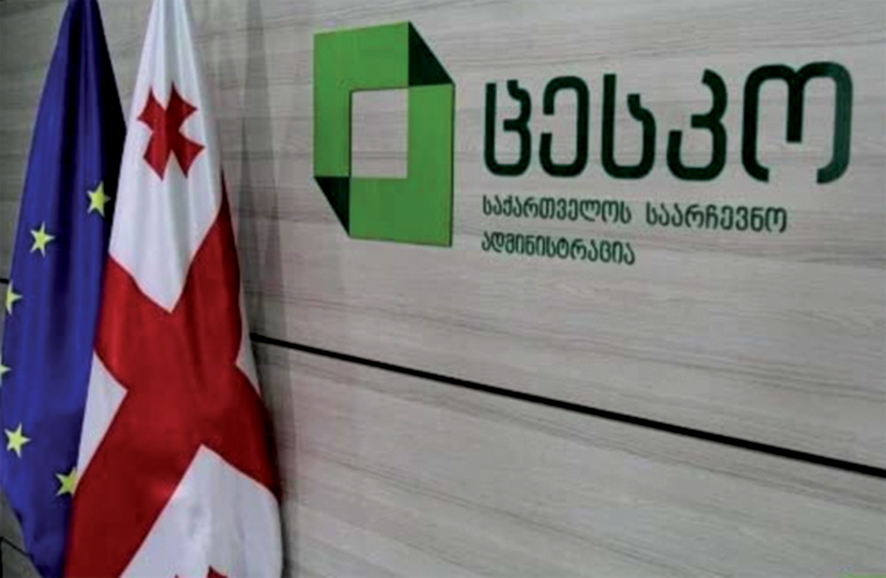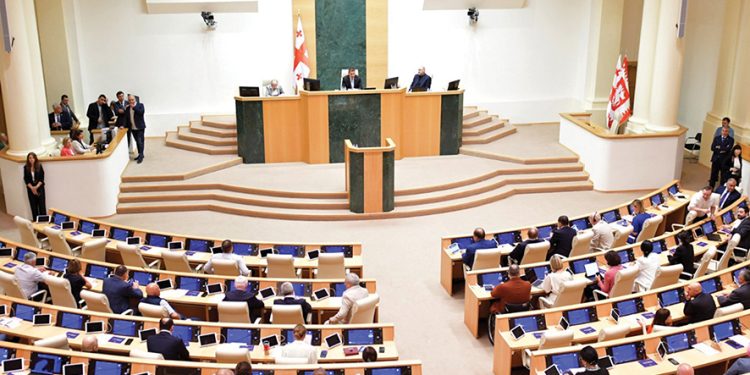Georgian parliament this week rejected the March 5 motivated remarks presented by President Salome Zurabishvili concerning changes to the Election Code. Twenty-one of the 116 MPs registered supported her remarks, while 61 were against.
Additionally, the initial version of the amendments to the Election Code was voted on and passed by a significant margin, with 78 votes in favor and 13 against.
President Zurabishvili vetoed the amendments to the Georgian Election Code on March 5, though they had been initially adopted by parliament on February 20.
The changes primarily focus on the process of electing the chairperson and professional members of the Central Election Commission (CEC), and introduce a three-stage process for their election, requiring a quorum of 3/5 votes. If 90 votes are not secured on the first voting, candidates can be elected with 76 votes.
Nominated candidates can receive support with 76 votes twice, after which the successful candidate will hold office for five years. If 76 supporting votes cannot be gathered, the matter will be transferred to the President to decide on. The President can appoint candidates from the list provided by parliament for a term of five years.
The amendments also involve changes to the regulations of parliament, specifying that the Parliament Speaker will announce the candidate selection competition instead of the President. The Speaker will also present nominations for the CEC Chair and its members to parliament. Notably, the position of deputy chairman of the CEC, who was to be appointed by the opposition quota, is to be abolished.
“Recent amendments to the Electoral Code, including those adopted in the third reading on February 20, 2024, when the delegation was in Georgia, do not comply with the recommendations of the Office for Democratic Institutions and Human Rights of the Organization for Security and Cooperation in Europe (OSCE/ODIHR) and the Venice Commission, and may further reduce confidence in the CEC,” the National Democratic Institute stated in a report released February 26.
The President’s 11-page motivated remarks, vetoing the amendments submitted to Parliament, also referred to the OSCE/ODIHR recommendations.
Among her remarks, she said that, based on the amendments, the President’s role in presenting candidates for chairperson and members of the CEC remains limited. She notes that adding a passage to the February 20 legislative amendments that “if parliament fails to elect a candidate twice consecutively, once by 3/5 and then 1/2 of the majority, will then hand the issue to the president,” does not increase the President’s quality of involvement, since it is unlikely that parliament will not be able to elect a candidate.

President Zurabishvili proposed announcing an open competition for the post of CEC Chair and members before May 1, 2024, whose 6-month and 5-year duty terms have expired. She also suggested establishing a competition commission to deal with relevant procedures.
Parliament Speaker Shalva Papuashvili said the President’s motivated remarks were devoid of ground and no veto was possible, since the bill included amendments to the regulations which were enacted one month prior, and which had already been signed by the Parliament Speaker.
Papuashvili denied allegations that the amendment contradicts European standards and the opinion of the Venice Commission, nor is it, he claims, in conflict with the EC’s nine steps, since the recommendation under the fourth point is to hold elections fairly, in a competitive environment.
The Speaker criticized the President’s veto, saying it would motivate the opposition to protest October’s election results. He claimed that the opposition MP’s appointment as the chairperson of the election administration was a “scheme.”
“We see the pressure exerted on the CEC chairperson, be it from the media, the opposition, or the non-governmental sector. They desire to remove him from the chairmanship and have the Lelo party hold the elections,” he said.
Papuashvili said he believes President Salome Zurabishvili’s only motive is to give “an excuse” to the United National Movement not to recognize the results of the elections for the fourth time. He said that eight opposition parties were represented in the CEC, and the speculation of the single-party support of the CEC chairperson was a blatant lie.
“Parliament is a supreme legislative body, and the majority is elected by the majority of the Georgian people. This is a democracy, and any suggestion otherwise is fiction. Elections will be held on October 26, and you will see on October 27 that this would have been a pretext for non-recognition of the election outcomes,” he said.
By Team GT














